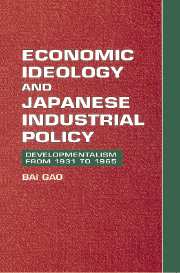Book contents
- Frontmatter
- Contents
- Acknowledgments
- List of abbreviations
- Note on Japanese usage
- 1 Introduction
- 2 The Ideology of Japanese developmentalism
- 3 The managed economy
- 4 Priority production
- 5 Promoting exports
- 6 High growth and liberalization
- 7 The institutional environment of economic reasoning
- Epilogue: Japanese developmentalism in historical perspective
- References in English
- References in Japanese
- Index
4 - Priority production
Published online by Cambridge University Press: 29 March 2010
- Frontmatter
- Contents
- Acknowledgments
- List of abbreviations
- Note on Japanese usage
- 1 Introduction
- 2 The Ideology of Japanese developmentalism
- 3 The managed economy
- 4 Priority production
- 5 Promoting exports
- 6 High growth and liberalization
- 7 The institutional environment of economic reasoning
- Epilogue: Japanese developmentalism in historical perspective
- References in English
- References in Japanese
- Index
Summary
Japanese industrial policy in 1946–9 was still dominated by the paradigm of the managed economy. Although many elements of the wartime economic system were greatly challenged by the democratic reforms of the occupation authority, the practice of priority production (keisha seisan hōshiki), which referred to concentrating human, financial, and material resources in the coal, iron and steel, and fertilizer industries in order to provide basic materials for postwar economic reconstruction in all industries, contributed greatly to transforming the wartime legacies into the postwar economy.
Japan's defeat in World War II opened a new chapter in its history. Like Germany, Japan experienced a storm of democratic reforms by the Occupation Authority. What was the impact of these reforms on postwar Japan? For a long time, 1945 was considered by many people the “birthday for a new Japan” (Noguchi 1995), a “Year Zero, when everything could be remade and redone” (Fallows 1994:120). In academic discussions, the discontinuity argument presented by Yamada Moritarō prevailed. It held that the postwar democratic reforms changed Japanese capitalism fundamentally because the production cycle of the Japanese economy was no longer sustained by militarism and colonies, the land reform eliminated the landlord class, and the majority of economic output shifted from textile industry to heavychemical industry (Ōishi 1974). This view was influential not only in Japan, but also in Germany. As Simon Reich (1990:4) points out, the astonishing achievement of Germany in postwar economic growth has been interpreted as being “like a phoenix [rising] from the ashes,” which had nothing to do with the German experience in the dark valley.
- Type
- Chapter
- Information
- Economic Ideology and Japanese Industrial PolicyDevelopmentalism from 1931 to 1965, pp. 121 - 172Publisher: Cambridge University PressPrint publication year: 1997



